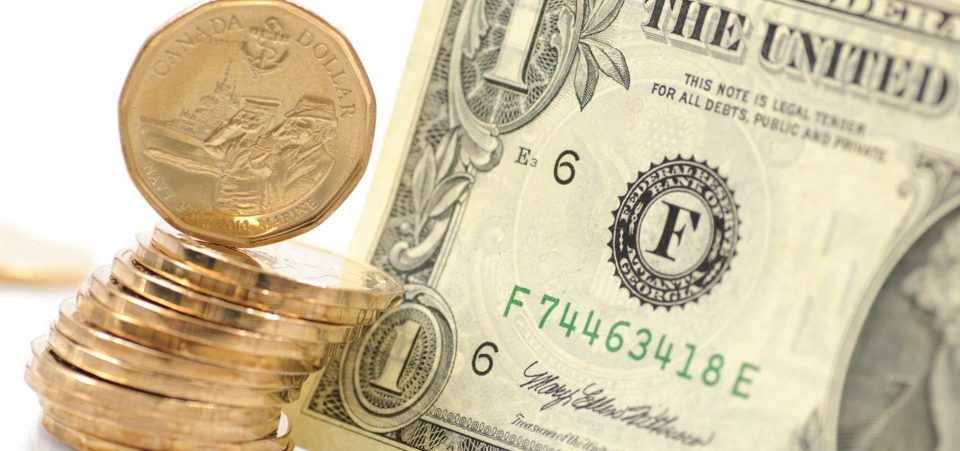CAD to USD Exchange Rate Could Collapse to 0.62
The Canadian dollar could be setting up to crash. Watch the CAD to USD exchange rate; it could be headed much lower. The Canadian dollar at 0.62 against the U.S. dollar wouldn’t be shocking.
You see, the odds are stacking higher each day for a much lower CAD to USD exchange rate. There are three things that investors have to keep in mind when looking at the Canadian dollar.
1. Bank of Canada Doesn’t Want Higher Canadian Dollar
Understand that central banks sometimes can play a major role in where the value of a currency goes. The Bank of Canada hasn’t openly said it, but its rhetoric suggests that it wants the Canadian dollar to go down.
Every time the CAD to USD exchange rate starts to move higher, the Bank of Canada comes out and says or does something that impacts the currency value. Be it something along the lines of enacting an interest rate cut, commenting on the current risks in the economy, or even saying it might initiate something similar to quantitative easing (QE) if there’s a need.
This is not good for the Canadian dollar.
2. Canadian Housing Market Is Starting to Look Scary
You may have not heard this in the mainstream media, but the Canadian housing market is starting to look very similar to the U.S. housing market just prior to the crash. Certain areas of the markets, especially Toronto and Vancouver, are in the spotlight, and home prices continue to soar.
Even the major banks in the country next door have come out and said this could end badly.
For instance, the chief economist at Toronto-Dominion Bank (NYSE:TD), one of the biggest banks in Canada, said in a note to clients regarding the Toronto housing market, “It’s getting harder to ignore warning signs that market demand pressures are increasingly reflecting speculative forces.” (Source: “Toronto home prices may jump 25% in 2017 with cycle starting to mirror others that ended badly: TD Economics,” Financial Post, March 21, 2017.)
If the housing market in Canada faces headwinds, it would be foolish to think it won’t impact the Canadian dollar. It could severely damage its value.
3. U.S. Import Tax
Currently, there’s a proposal at U.S. Congress that talks about a possible import tax. If this comes into effect, it could severely damage the CAD to USD exchange rate.
Here’s what investors need to understand: Canada exports a significant amount of goods to the United States. If the import tax is something that’s implemented, Canadian exports could get hurt. This would impact the Canadian economy, and ultimately the Canadian dollar.
Here’s some food for thought: to make Canadian products competitive in the U.S., could the Bank of Canada work hard to lower the currency further?
CAD to USD Exchange Outlook: Canadian Dollar Could Collapse
Dear reader, it’s very difficult to have a bullish outlook on the CAD to USD exchange rate. This is something I have talked about over and over in these pages.
As I said earlier, the odds of a Canadian dollar collapse are increasing each day. My public prediction is that the CAD to USD exchange rate could drop to as low as 0.62. I stick to this prediction, and I will not be surprised if it happens sooner, rather than later.
There’s only one thing that would change my projections on the Canadian dollar, and that is if the U.S. economy all of a sudden starts to slow down and the U.S. Federal Reserve lowers the interest rates.






